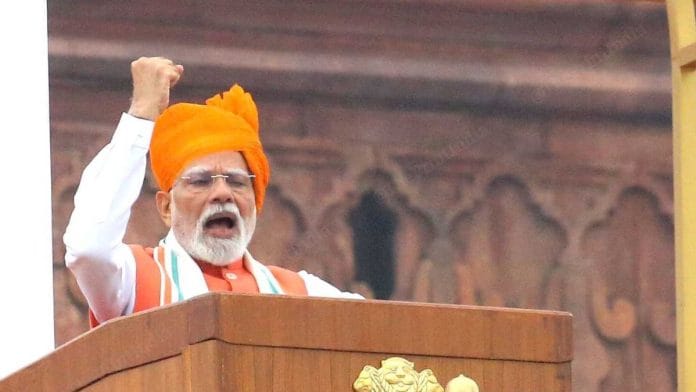Chennai: At a time when states including Tamil Nadu, Karnataka, Maharashtra and West Bengal are up against the three-language policy, Prime Minister Narendra Modi during his Independence Day speech emphasised “taking pride in different languages spoken in the country”.
His statement comes at a time when two southern states, Tamil Nadu and Kerala, are heading to polls in May 2026 and when states like Tamil Nadu, Maharashtra and Kerala are opposing the imposition of Hindi.
In recent years, language has not just been a cultural issue but a political flashpoint, often drawing sharp criticism and counter criticism between the Union Government led by the BJP and state governments led by regional parties, including DMK in Tamil Nadu.
Addressing the nation from the Red Fort after hoisting the national flag on the occasion of Independence Day, Prime Minister Narendra Modi said that the diversity in the country should be celebrated.
Advocating equal importance to every language, he said, “We should take pride in the different languages spoken in our country. Our country is filled with the vibrancy of languages.”
He also said he was proud to have conferred Classical Language status to five more Indian languages—Assamese, Bengali, Marathi, Pali and Prakrit—in October 2024. These languages join other languages like Tamil, Sanskrit, Telugu, Kannada, Malayalam and Odiya in the Classical Language category.
“The more our languages develop, the more our knowledge system will be enriched. Our language has so much strength, we should be proud of all our languages,” the PM said.
This is not the first time Prime Minister Narendra Modi has touched upon the language issue. In 2024, during his Independence Day speech, he emphasised the importance of studying in one’s mother tongue.
“I firmly believe the new education policy emphasises the importance of the mother tongue. I urge state governments and all institutions in the country that the country’s talent should not be hindered because of language. Language should not be a barrier. The strength of the mother tongue empowers even the poorest child in our country to fulfill their dreams,” he said in his 2024 address.
While the Prime Minister’s remarks might have been framed as a call for cultural pride, the political context makes them significant. In Tamil Nadu, the ruling DMK has strongly opposed any form of Hindi imposition, maintaining a two-language formula of Tamil and English. The Tamil Nadu government has even rejected the National Education Policy and released a separate State Education Policy.
Kerala has also voiced similar concerns, aligning with Tamil Nadu in opposing the attempt to promote Hindi over other Indian languages. In Maharashtra, regional parties have criticised the perceived marginalisation of Marathi in favour of Hindi and English in central government initiatives.
With Tamil Nadu and Kerala heading to Assembly elections in May 2026, language politics is expected to remain a potent campaign issue. The Prime Minister’s reference to the classical status granted to regional languages, such as Marathi and Bengali, may be seen a strategy to address criticism from the Opposition.
With less than nine months to the assembly elections, even neutral cultural statements can acquire political weight in the charged atmosphere of South India’s language debate. The Prime Minister’s call to celebrate India’s linguistic diversity could be seen as a political message ahead of the assembly elections in Tamil Nadu and Kerala.
(Edited by Viny Mishra)







Let us be a bit braver here.
Bharatiya languages coexisted for centuries, never saw feuds like this.
Then, two things happened:
(1) Urdu was born as a direct consequence of Rasulullah (SAWS)’s OG two-nation theory – believers being supposed to differentiate themselves from non-believers in every aspect (including language). You can see this in Urdu, e.g. Urdu people will set themselves apart form Hindi-speakers by even things as petty as minor pronunciation differences (e.g. prārthanā –> prāthnā , parvat –> parbat, etc.), and of course the entire Perso-Arabicisation that is obvious at a first glance.
Significance: This is the beginning of the idea of language as a marker of communal identity, separate from and antithetical to that in the immediate environment (I am not pro-homogenisation, so I reject the idea of “one” mainstream – but the difference here is intended to set oneself apart, or really stick out [like a sore thumb sometimes] from one’s immediate surroundings).
(2) The advent of English which came with a clear hierarchy, where all languages of the uncivilised “orient” were inferior, rustic, backward, and not worth studying or using in education, science, official purposes etc.
Significance: Combined with the rise of British power, the capture of education by missionary and colonialist forces over a couple of centuries gradually led to the internalisation of the hierarchy of world languages, where English is at the top, and other western languages a close second, with Bharatiya languages being good-for-nothing at best or often even a mark of shame.
Thus, we internalised two different notions from these historical experiences: (1) Urdu imperialism taught us that language is a marker of identity (it is, no doubt) – BUT “identity” is perverted into a separatist/adversarial sense. Then, (2) taught us that there is a hierarchy of languages, superior and inferior, a view we did not hold before (as an example, consider the rich exchange of vocabulary between Thamizh and Sanskrit, and how both nourished and enriched the other Bharatiya languages in their spheres of influence).